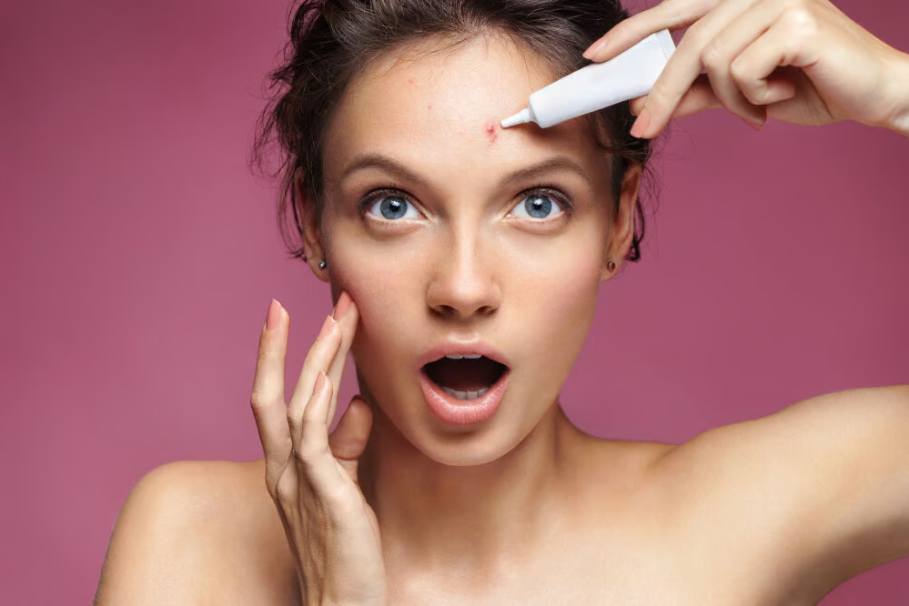Acne is a persistent skin issue that can impact people of all ages, but when it comes to hormonal acne, the struggle can be particularly frustrating. Hormonal acne, typically associated with fluctuations in hormone levels during puberty, menstruation, pregnancy, and menopause, often leads to breakouts that seem resistant to traditional treatments.
With the growing interest in natural remedies, Vitamin E has emerged as a potential solution. But the question remains: Does Vitamin E work for hormonal acne?
The short answer is: Yes, but with caveats. Vitamin E can be effective in managing hormonal acne, but its effectiveness depends on how it’s used, the severity of the acne, and the individual’s unique skin type and hormonal balance.
Recommended: 10 Best Vitamins For Hormonal Acne
In this article, we will delve into the science behind Vitamin E, explore how it may help with hormonal acne, and provide guidance on its proper use.
What Makes Hormonal Acne Different?
Before we explore how Vitamin E might help with hormonal acne, it’s crucial to understand what sets this type of acne apart from other forms. Hormonal acne is directly linked to fluctuations in hormone levels, particularly androgens like testosterone.
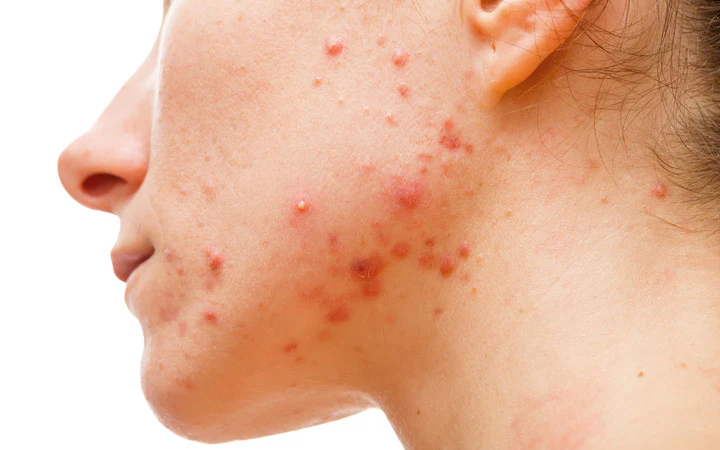
These hormones can trigger the overproduction of sebum (skin oil), which, when combined with dead skin cells, clogs pores and leads to inflammation and acne.
Recommended: 9 Best Supplements For Perimenopause Weight Gain
Key Characteristics of Hormonal Acne
- Appears primarily on the lower face, jawline, and neck.
- Often manifests as deep, cystic bumps rather than surface-level whiteheads or blackheads.
- Typically flares up in sync with the menstrual cycle in women.
- Can be persistent and difficult to treat with over-the-counter acne treatments.
The Role of Vitamin E in Skin Health
Vitamin E is a powerful antioxidant that plays a vital role in skin health. It protects skin cells from damage caused by free radicals – unstable molecules that can accelerate aging and contribute to various skin issues, including acne.
Vitamin E is also known for its moisturizing properties, which help maintain skin hydration and support the skin’s natural barrier function.
Recommended: Does Magnesium Affect Breast Milk Production?
Benefits of Vitamin E for Skin
- Antioxidant Protection: Shields skin from environmental damage.
- Moisturization: Helps to keep the skin soft, supple, and hydrated.
- Healing Support: Promotes the healing of scars and reduces inflammation.
Given these benefits, it’s clear why Vitamin E is often touted as a remedy for various skin conditions, including hormonal acne. But how exactly does it work?
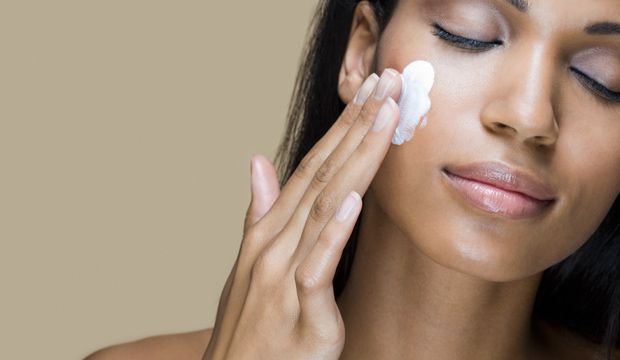
How Does Vitamin E Work for Hormonal Acne?
Vitamin E can potentially help with hormonal acne in several ways, primarily due to its anti-inflammatory and antioxidant properties. Let’s break down how it may address the root causes of hormonal acne:
1. Reducing Inflammation and Redness
Inflammation is a significant factor in acne development. Hormonal acne often presents as red, swollen, and painful cysts or nodules. Vitamin E’s anti-inflammatory properties can help soothe the skin, reducing redness and swelling, which makes breakouts less noticeable and more manageable.
2. Balancing Oil Production
Vitamin E’s moisturizing properties can also help regulate oil production. While it might seem counterintuitive to apply an oil to oily skin, Vitamin E can actually balance sebum production by keeping the skin hydrated. When the skin is properly moisturized, it may produce less oil, leading to fewer clogged pores and breakouts.
Recommended: How To Use Neem Oil As a Contraceptive
3. Supporting Skin Healing
Hormonal acne often leaves behind scars and hyperpigmentation, which can be as frustrating as the breakouts themselves. Vitamin E is known for its skin-healing properties. It promotes the regeneration of skin cells and can reduce the appearance of scars over time, making it a valuable tool in post-acne skin care.
4. Neutralizing Free Radicals
Hormonal changes can increase the production of free radicals in the skin, leading to oxidative stress and worsening acne. Vitamin E, as an antioxidant, helps neutralize these free radicals, protecting the skin from further damage and potentially preventing future breakouts.
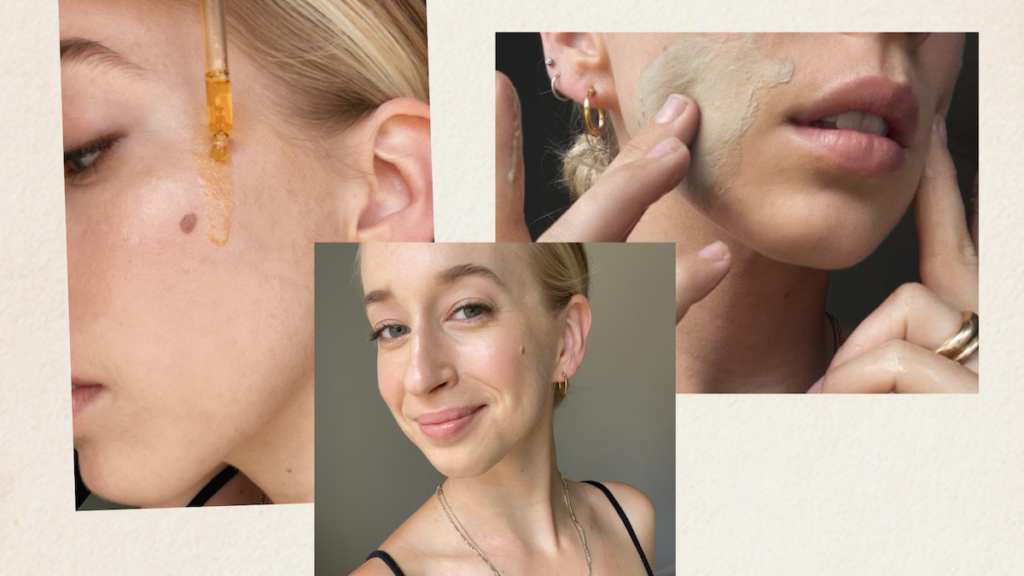
How to Use Vitamin E for Hormonal Acne
While Vitamin E offers numerous benefits for the skin, using it correctly is crucial to achieving the desired results. Here are some effective ways to incorporate Vitamin E into your skincare routine to combat hormonal acne:
1. Topical Application
Vitamin E is most commonly applied directly to the skin in the form of oils, serums, or creams. For hormonal acne, look for products that contain pure Vitamin E oil or a combination of Vitamin E and other acne-fighting ingredients like Vitamin C or retinoids.
Tips for Topical Use:
- Patch Test First: Before applying Vitamin E to your face, perform a patch test on a small area of skin to check for any allergic reactions.
- Apply Sparingly: Vitamin E is potent, so a little goes a long way. Use a small amount to avoid clogging pores.
- Use at Night: Apply Vitamin E at night as part of your evening skincare routine. It can be heavier than other products, so nighttime application allows it to work without interference from makeup or sunscreen.
Recommended: What Does a Vasectomy Scar Look Like?
2. Dietary Supplements
Taking Vitamin E supplements can also support skin health from the inside out. However, it’s essential to consult with a healthcare provider before starting any supplement, especially if you have underlying health conditions or are already taking other medications.
The daily recommended dose of Vitamin E for adults is around 15mg. It’s available in various forms, including natural and synthetic versions. Natural Vitamin E (d-alpha-tocopherol) is more easily absorbed by the body.
3. Combining with Other Treatments
Vitamin E can be used in conjunction with other acne treatments. For example, pairing it with salicylic acid or benzoyl peroxide can enhance its acne-fighting effects while minimizing potential irritation from these stronger treatments.
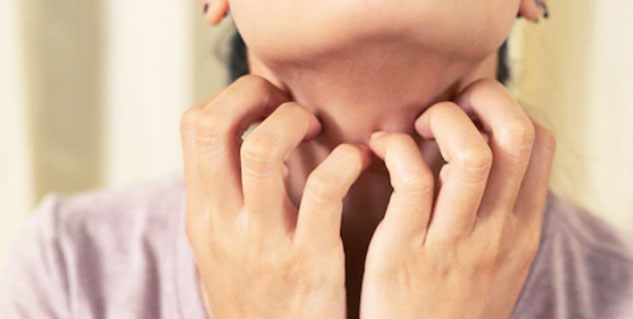
Potential Side Effects and Precautions
While Vitamin E is generally considered safe for most people, it’s not without potential side effects, especially if used incorrectly.
1. Clogged Pores
Although Vitamin E can balance oil production, it can also clog pores if used excessively, leading to more breakouts. This is particularly a concern for those with oily or acne-prone skin.
2. Allergic Reactions
Some people may experience allergic reactions to Vitamin E, particularly when applied topically. Symptoms can include redness, itching, and swelling. If you notice any of these signs, discontinue use immediately and consult a dermatologist.
Recommended: Key Signs Of Infection After Breast Surgery
3. Interaction with Medications
If you’re taking acne medications or other treatments, Vitamin E may interact with them. It’s always best to discuss with a healthcare provider before adding new supplements or topical treatments to your routine.
The Verdict: Is Vitamin E Effective for Hormonal Acne?
So, does Vitamin E work for hormonal acne? The answer is nuanced. Vitamin E can be an effective part of a holistic approach to managing hormonal acne, particularly when used to reduce inflammation, support skin healing, and balance oil production. However, it’s not a one-size-fits-all solution and may not work for everyone.
For best results, incorporate Vitamin E as part of a broader skincare regimen that addresses the underlying hormonal causes of acne. And remember, patience is key – skin health doesn’t improve overnight, but with consistent care, you can see significant improvements over time.
Conclusion
Vitamin E is a valuable tool in the fight against hormonal acne, offering both protective and restorative benefits. However, it should be used thoughtfully and in combination with other proven acne treatments to achieve the best results.
